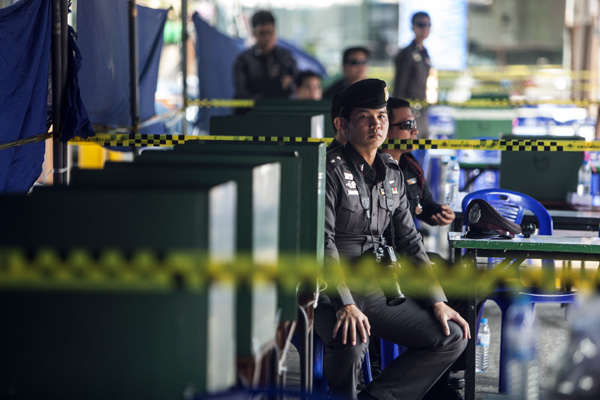 |
|
A Thai policeman sits next to ballot boxes at a polling station after anti-government protesters block its entrance in Bangkok January 26, 2014. [Photo/Agencies] |
INTRACTABLE DIFFERENCES
On Saturday, a government minister said Yingluck was prepared to discuss cancelling the February 2 election if the activists ended their protests.
Foreign Minister Surapong Tovichakchaikul, also a deputy prime minister, said in a televised address the blocking of advance voting was "a serious offence" and said protesters had used force to stop people voting.
Yingluck's government had already warned anyone who tried to stop voting would be jailed or fined.
City officials said they had begun negotiating with the protesters. "We have to negotiate with them and let them know that blocking the election is illegal," said Luckana Rojjanawong, a Bangkok district official said.
It was already unclear whether the election would go ahead after a Constitutional Court ruling on Friday that opened the possibility of a delay. The Election Commission has also called for a delay, saying Thailand is too unsettled.
The government declared the 60-day state of emergency to try to curtail protests after the demonstrators vowed to shut down Bangkok on January 13.
The protesters say Thaksin's powerful political machine has subverted Thailand's fragile democracy by effectively buying the support of rural voters with populist policies such as cheap healthcare and subsidies for rice farmers.
Paul Chambers, director of research at the Institute of South East Asian Affairs in northern Chiang Mai, said before the violence began that the disruption of advance polling would add impetus to the calls for an election delay.
"The ability of those against advance voting to keep it from happening today could signal what may come next week - a decision to delay the vote due to an inability to hold the election properly," Chambers said.
Yingluck, who would probably win the election easily, is set to meet Election Commission officials on Tuesday. The main opposition Democrat Party also plans to boycott the election.
About 49 million voters out of Thailand's population of 66 million are eligible to cast ballots, with about 2.16 million registered for early polling.
Yingluck's government had been proceeding relatively smoothly until her Puea Thai Party miscalculated in November and tried to force through an amnesty bill that would have allowed her brother to return a free man despite a 2008 graft conviction he says was politically motivated.
Thaksin, a billionaire former telecoms tycoon, was ousted by the military in 2006.
|
|
|
|
|
|
|
|
